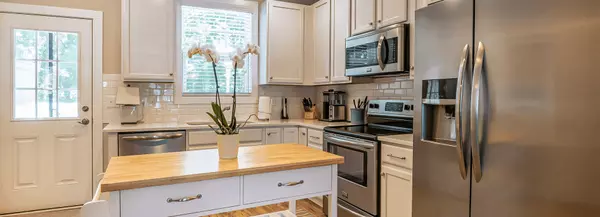Real Estate, Redefined.
Huskey Real Estate Group
Brian & Rae Huskey | A Customized Real Estate Experience
A premier real estate group in Billings, Montana offering unparalleled customer service. We serve families in ways that go beyond just a real estate transaction. Whether buying, selling, or investing, you are the heart of everything we do.
Featured Searches
MY BLOG

4 Most Common Reasons Why People Sell Their Home
People sell homes for a huge range of reasons... The reason that you want to sell your home could influence the approach you take to selling. For example, you might feel comfortable letting your house sit on the market for several months when you simply want to move to a different neighborhood. If you need to relocate for a job or to live closer to family, though, you might feel more pressure to sell your house quickly. No matter why you want to sell your home, a Realtor can help you get the best price within a time frame that works for you. They Plan to Relocate to a Different City for Career Opportunities More than 49% of people say that they want to move for career advancement opportunities. Relocation for work is the most common reason people sell homes. A person living in City A might consider moving to City B when an employer offers to pay them a significantly higher salary or let them work on exciting projects. Moving for a job opportunity usually applies to certain demographics more than others. About 40% of people who move for new jobs are between 25 and 34 years old. This makes sense because recent graduates often leave their college towns to find employment in other cities. Since 26.44% of employers assist with moving expenses, young professionals can start their careers or move into management positions without spending money on the relocation. Nearly 37% of people between ages 35 and 54 move for new job opportunities. Importantly, about a quarter of home buyers are in their 30s, and the average home buyer is 45 years old. Many of these people need to sell homes quickly so they can relocate and purchase property in a new city. Paying two mortgages at the same time would cause significant financial strain, so it’s imperative to sell as soon as possible. They Need Larger or Smaller Homes to Match Their Needs The housing needs of a family can change dramatically over the decades. A single person may only need a small home with one or two bedrooms. A couple may want a slightly larger place to live. Couples frequently sell their “starter homes” when they have children or change their lifestyles. A couple of decades later, people may find themselves in the opposite situation. Now, they may want to sell homes, so they don’t need to care for such large properties. Additionally, downsizing often means spending less money on property and taxes. As people near retirement, they recognize the benefits of selling larger, costlier homes in favor of smaller homes with lower values. (Lower property values lead to paying lower property taxes in most places.) They Want to Live Closer to Loved Ones or Amenities Life can take you all over the world. Eventually, though, you might want to return to your hometown or explore other amenities that cities and states have to offer. About 50% of people say they stay in their hometowns because they want to remain close to family. It makes sense to assume that plenty of people also move back home for the same reason. They Don’t Like How the Neighborhood Has Changed A neighborhood’s personality can change a lot within just a few years. As new businesses and people move into the area, your community might start to lose some of the characteristics that attracted you when you bought your home. Maybe you bought an apartment downtown because you loved the hustle and bustle. Now, you find that the events you enjoyed tend to take place in the suburbs. You might decide to sell your house and move closer to the action. The opposite is true for other people. Maybe you bought a house in a quiet suburb because you didn’t want a lot of neighbors. Now, the area’s population has grown, and you would like to relocate to a more rural spot. Sell Your Home With Help From a Professional No matter why you want to sell your home, an experienced professional can help you make a plan that matches your unique needs and connects you to potential buyers. Need advice? Let’s talk about the best way to sell your home! Click Here
Read more
Is Spring a Good Time to Sell?
If you’re looking to take advantage of the red-hot seller’s market, you may be wondering, “when should I sell my home?” The answer is spring! The era of historically low interest rates is coming to an end, meaning buyers won’t be as eager to jump the gun as rates continue to rise. So, if you’re looking to cash in on current market conditions, this spring is the perfect time to do so before interest rates rise too much and the market swings back in favor of buyers. Benefits of Spring Selling Selling in the spring comes with some pretty awesome benefits for sellers, including: Sell for More Spring has long been considered the best time of the year to sell homes, for many reasons, including the fact that you’ll be most likely to maximize the selling price and make the most money — especially during spring 2022’s market conditions, home sales are expected to reach a 16-year high. According to reports, most sellers who list their homes in May can expect them to sell 18.5 days faster than any other month and for nearly six percent more money. The report notes that April or June have even better home sales in some areas of the country than May. Curb Appeal Trudging through a snow-covered driveway overlooking a dead garden and brown grass isn’t exactly appealing. But, in the spring, the flowers come out, the grass turns greener and the birds start chirping — making for a much more visually appealing process. If you want to present your home in the best (sun) light possible, spring is an excellent season for selling, especially if you have a pool, water fountain, garden, outdoor kitchen, or any other feature that is meant for the warmer months. More Buyers As the weather warms up, you can expect to see more buyers in the market. Many homebuyers start their search during the spring because they know the selection will be better and they can schedule the move around their children’s school schedules. Better Moving Weather Who wants to lug heavy boxes and move into a cold and unfurnished home during freezing temps? Not us! Spring offers more comfortable moving weather — not too cold and not too hot. Spring temperatures are perfect for an enjoyable move. Disadvantages of Spring Selling But, similar to spring weather, spring selling is not all rainbows and butterflies — there are some downfalls too, including: Higher Moving Company Rates Unfortunately, the secret of spring selling is not unknown. Movers are looking to cash in on the busy season as well, and many may even hike their rates due to increased competition, which can also make it harder for you to nail down a moving date where all required parties are available. Try to book your spring move ASAP to ensure you get a spot on the mover’s calendar before it fills up. More Competition If you list your house in the dead of winter, you may be able to capitalize on low inventory. But, in the spring, the market becomes more saturated, meaning potential buyers have many more options. This is why it’s important to make sure your house stands out, from beautiful landscaping, fresh flowers, an updated kitchen, etc. School Is in Session Moving with kids can be challenging, especially if they’re in school. If you end up selling your home in the spring, you’ll have a lot more to plan logistically with the kids’ schedules. This can disrupt your kids’ learning and their social activities and routines. If you’re worried about disrupting your kids’ school year to move, we recommend moving at the tail-end of spring to early summer.
Read more
What Could a Recession Mean for the Housing Market?
Wherever you look in the news right now, the word “recession” keeps coming up. Is the US in a recession, and if not, will it be soon? How would a recession impact the housing market? These are understandable questions right now. Whether you are a homebuyer or a home seller, you will want to prepare yourself for the potential consequences of a recession. Home sellers have enjoyed a seller’s market conditions for the past two years, but it may be time to adjust expectations as the real estate market shifts. Let’s explore what a recession entails, how likely the US housing market is to suffer from one, and what you need to bear in mind if you’re planning to buy or sell a house in the foreseeable future. Is the US in a recession? No. According to the latest GDP report, the US economy has avoided a recession, even though the rate of economic growth is slowing while inflation keeps rising. The US GDP shrank by 0.9% in the last quarter, while the inflation rate has risen to 9.1%. This is leading to rising interest rates and reduced consumer spending. Although the economy is not in the best of health, we are not yet in a recession technically and will unlikely to be in one until at least 2023. What does a recession mean for the real estate market? Recessions impact the real estate market, often drastically. The most severe negative case scenario is a housing market crash following a recession, like the one that followed the 2008 financial crash. In a recession, homes tend to become unaffordable for a much larger percentage of the population, often over a very short time. Job losses and a resulting high unemployment rate, coupled with steeply rising mortgage rates, make it that much harder for homebuyers to qualify to buy a home. And what happens when there are fewer buyers on the market? Sellers have no choice but to lower home prices to attract the homebuyers still left on the market. A recession is pretty much incompatible with a seller’s market. Will the housing market crash if we go into a recession? Not necessarily. In fact, given the current unique housing market conditions, this is unlikely. “This is not the same market of 2008,” Odeta Kushi, First American’s deputy chief economist, told Insider. The downfall of the housing market in 2008 was its reliance on cheap mortgage loans that had put a vast number of homeowners in a precarious position. Put simply, people had been given mortgages they could barely afford, and the financial crash made them unable to keep their homes. In many cases, mortgages became unaffordable within weeks. Many homeowners also found themselves in an underwater mortgage situation where the amount they owed on their home was more than the value of the home. This trapped people in homes they were unable to pay for yet were also unable to sell. Today’s real estate market is fundamentally different. The US housing market is in much better shape through a combination of tougher lending practices and unprecedented home value growth since the pandemic. Almost 50% of US homeowners now have equity-rich housing. Meaning they own at least 50% of their homes. This makes a repeat of the 2008 housing market scenario extremely unlikely. Having said that, it is likely that the housing market will continue slowing over the coming years. We won’t see the 20% rate home price growth of 2020-21 again. That much is certain. What would a recession mean for home buyers? A recession impacts what it costs to buy a home as mortgage rates tend to change. Affordability criteria also tend to become more stringent in other ways. Lenders may start asking for bigger down payments in order to reduce their lending risks, and they will pay closer attention to buyers’ job situations. Insecure or self-employed status usually becomes a harder sell when getting a mortgage during a recession. However, none of that means that a recession makes it impossible to buy a home. If you have a steady income and enough saved for a decent downpayment, your situation won’t change dramatically. Of course, having access to an emergency savings pot is a very good idea with the possibility of a recession growing. Having savings to fall back on is often the difference between being able to keep a home and foreclosure. What would a recession mean for home sellers? Home sellers may worry about a reduction in their home values, which may result either in a reduction in the profit from a home sale or in the dreaded negative equity situation. Home sellers with little equity built up are particularly at risk of this scenario. All home sellers should mentally prepare themselves for the end of a seller’s market situation should a recession hit. Again, however, these are unlikely case scenarios in 2022. The housing market is not about to crash. Some sellers shouldn’t expect lower home values, but they should expect more modest growth. Home prices have been so high for the past two years that it will take a considerable amount of time before we can even consider the possibility of home prices falling. We're Here to Help Whether you're thinking about selling your home or getting ready to purchase your dream home (or anywhere in between) it's important to educate yourself about the housing market. We publish new content every month that can help! Read Our Blog
Read more
